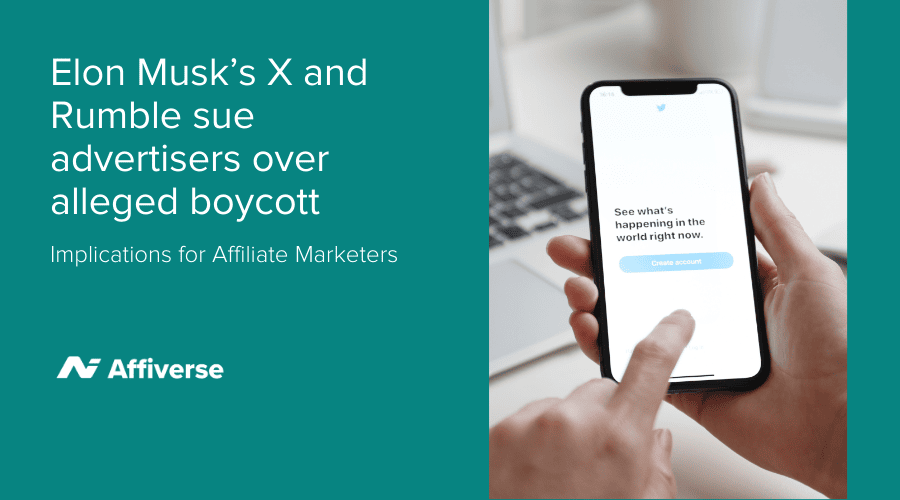Elon Musk’s X and Rumble sue advertisers over alleged boycott

Elon Musk’s social media platform X, formerly known as Twitter, and video hosting site Rumble are suing an international advertising group, alleging a conspiracy to boycott their platforms.
The lawsuit accuses the Global Alliance for Responsible Media (GARM) and the World Federation of Advertisers (WFA) of persuading major brands such as CVS Health, Mars, Unilever, and Ørsted to withdraw advertising revenue, violating antitrust laws.
The lawsuit claims that GARM’s actions have unfairly targeted X and Rumble by applying a “one-size-fits-all” standard that doesn’t account for the unique content moderation policies of each platform. This move, according to the lawsuit, has led to a significant loss of advertising revenue for both companies. X and Rumble are seeking a permanent injunction against the boycott, as well as damages and legal fees.
The conflict began after Musk acquired Twitter in 2022. Following the acquisition, GARM raised concerns about the platform’s compliance with brand safety standards, which led to an organised boycott by several major advertisers. Despite X’s efforts to comply with these standards, including making significant changes to its content moderation policies, the boycott has continued.
Linda Yaccarino, CEO of X, stated in an open letter that the boycott undermines the “marketplace of ideas” by depriving X’s users of a diverse range of viewpoints. She argued that the coordinated action by GARM and the advertisers was intended to coerce X into complying with their standards, which she believes is an illegal and unfair practice.
Musk has been vocal about his stance on free speech and the impact of the boycott on the platform. He urged other companies facing similar issues to take legal action and suggested that there may be criminal liability under the RICO Act. He emphasised the need for justice and highlighted the negative impact of the boycott on free expression and business.
Rumble, which has also experienced an advertiser pullout, joined X in the lawsuit. The platform accused GARM of using its brand safety standards to unfairly target and harm Rumble. This joint legal action underscores the growing tensions between tech platforms and the advertising industry over content moderation and brand safety.
In response to the lawsuit, GARM and WFA have denied any wrongdoing. They argue that their actions are aimed at ensuring brand safety and protecting advertisers from associating with harmful or inappropriate content. They maintain that their standards are necessary to maintain a safe and positive environment for brands and users alike.
Implications for Affiliate Marketers
This legal battle could have significant implications for affiliate marketers, who rely on a diverse range of platforms to reach their audience and generate revenue. Here are some potential impacts:
- Increased Scrutiny on Content: If the lawsuit results in stricter enforcement of content moderation policies, affiliate marketers might need to be more cautious about the content they create and promote. Platforms may implement more rigorous guidelines to avoid potential boycotts, which could limit the types of content that affiliate marketers can use to promote products and services in these channels.
- Advertising Revenue Shifts: Should X and Rumble win the lawsuit, there might be a shift in how advertising dollars are allocated. Brands could become more cautious about participating in boycotts, leading to more stable revenue streams for affiliate marketers using these platforms.
- Legal Precedents: A successful lawsuit could set a legal precedent, encouraging other platforms facing similar boycotts to seek legal remedies. This could lead to a more stable advertising environment, benefiting affiliate marketers by providing a more predictable platform policy landscape.
- Platform Trust and Safety: As platforms like X and Rumble strive to comply with brand safety standards to avoid future conflicts, they might enhance their trust and safety measures. This could create a more secure environment for affiliate marketers to operate, potentially increasing consumer confidence and engagement with affiliate content.
- Diversification of Marketing Channels: In light of the uncertainties brought by such lawsuits, affiliate marketers might consider diversifying their marketing channels. Relying on multiple platforms can mitigate risks associated with policy changes or advertiser boycotts on any single platform.
The outcome of this case could have far-reaching consequences for the future of social media and online advertising, directly affecting how affiliate marketers operate. Keeping an eye on the developments and preparing for potential changes will be crucial for affiliate marketers aiming to navigate this evolving landscape successfully.
Final thoughts
Elon Musk’s X and Rumble are standing firm in their fight against what they see as an unjust and illegal boycott. They are determined to seek justice and protect the rights of their users and businesses. The legal proceedings will be closely watched by the tech and advertising industries, as well as by users who value the principles of free expression and open dialogue.
As the case unfolds, it will be important to monitor the reactions of other major advertisers and industry groups. Their responses could influence the dynamics of the case and potentially impact the broader landscape of digital advertising and content moderation. The stakes are high, and the outcome of this lawsuit could have far-reaching consequences for the future of social media and online advertising, particularly for affiliate marketers who must adapt to these shifts to maintain their success.






